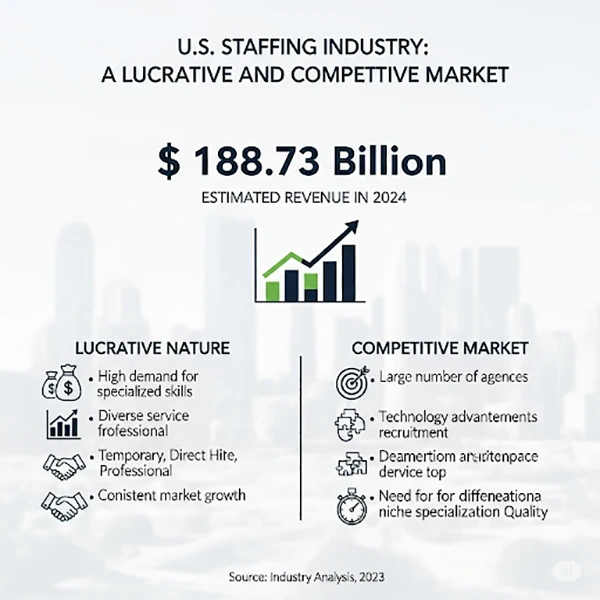Top Factors Influencing Staffing Agency Location Success

In the dynamic world of business, location is everything, and for staffing agencies, it’s the foundation of success.
Staffing Industry Analysts (SIA) forecasts that the US staffing industry is projected to reach an impressive $188.7 billion in 2025, a testament to the ongoing demand for flexible workforce solutions. But not every agency will see a piece of that growth.
The difference between a thriving agency and one that struggles often comes down to one crucial decision: where to set up shop. This article will show you that choosing an agency’s location is far from a simple act of picking a building.
It’s a strategic, data-driven process that requires a deep understanding of local market conditions, a thorough analysis of the competition, and a precise plan for building client relationships.
KEY TAKEAWAYS
- Don’t choose a location based on a gut feeling. A successful staffing agency relies on a detailed analysis of the local market, including industry trends and client needs.
- Understanding your competitors’ services, strengths, and weaknesses allows you to find your unique niche and stand out in the market.
- The quality of the local workforce, including education levels and industry experience, is far more important than just the quantity of jobseekers.
- Research local economic indicators like GDP growth, new business formation, and unemployment rates to ensure the market can support staffing demand.
- The availability of high-speed internet, reliable telecommunications, and a strong transportation network for candidates is crucial for efficient operations.
- Look for markets with demographic and economic trends that support future growth, and plan for scalability from day one.
Assessing the Market
When it comes to selecting agency locations, the most common mistake staffing agencies make? Selecting based on gut instinct instead of data.
Smart staffing businesses don’t just begin setting up locations wherever they feel like. Before investing in any real estate, they conduct due diligence and study the state of the local market.
A lot of location success ultimately comes down to understanding your potential clients. What businesses dominate the local market? Do companies in the area use staffing services already? Is there an overlooked need for staffing solutions?
Look at employment statistics and hiring trends. Seek out locations where local businesses are growing, as this indicates a greater need for employees.
Don’t forget:
You can make more profit in a smaller market with less competition, as market size is just one piece of the puzzle.
Competition Analysis
Why do some locations of staffing agencies thrive while others barely make ends meet?
Due to competition analysis. It’s crucial to understand the competitive landscape before you commit to opening a location.
What other staffing firms are operating in the area? Which services are available from them? What are their strengths and weaknesses?
The smart staffing agencies already understand how to position themselves in a way that stands out. You can provide executive search services; perhaps the other agencies concentrate more on temporary employees. Or maybe everyone is a generalist, and you specialize in professional medical staffing.
Competition isn’t forever a bad thing. It’s a positive indication that there is a need for staffing services in the region in many ways.
Growing companies often find a national staffing agency that can provide a consistent level of service to each branch.
Evaluating the Talent Pool
We recently caught wind of a staffing company in a major metropolitan area.
The jobseeker market is huge! They can select candidates for anything. The issue is that they’re not hiring for their customers’ needs, but rather for low-paying positions at fast food restaurants. All of a sudden, they realized that the quality of your local talent pool is far more important than the quantity.
When researching possible areas, consider:
- Education levels of the area’s workforce
- Industry experience with talent pool
- Local training programs
- Mobility and retention of the workforce
Regions with local colleges and training centers are estimated to have a better talent pool. Because those employees typically have more experience, large employers who have downsized can also benefit greatly in building a Client Base
Location success begins before you even open your doors. Therefore, you also need to commence building local relationships while you’re still setting up shop.
Do your research, locate possible customers in your target market, and learn about their problems. Are staffing agencies currently providing services to them?
Ideal locations will have:
- Numerous industries that regularly use staffing services
- Growing firms with fluctuating workforce needs
- Seasonal businesses that need temporary staff
- Companies expanding their operations
Don’t solely depend on a few clients in a single industry. To avoid being overexposed to one industry, diversify your clientele by working with a variety of sectors.
Considering the Economic Environment
We touched on this briefly above, but it continues to repeat.
Local economic health plays a huge role in staffing agency success.
You should look at unemployment rates, but search in core than just the headline number. Low unemployment can also refer to a tight labor market. This can make it more challenging to find qualified candidates, but easier to place the ones you do acquire at higher rates.
Monitor these local economic indicators as well:
- Local GDP growth
- New business formation
- Commercial real estate activity
- Infrastructure improvement
Locations in areas that are experiencing economic growth are most likely need more staffing services. Note that these economic conditions are fluid, and you need to adapt.
Technology and Infrastructure
A lot of staffing agencies ignore this crucial factor when picking locations:
The quality of local technology and infrastructure.
If you can’t perform efficiently, the lower overhead costs of a certain area aren’t going to matter.
Think about it. You need to have access to good telecommunications, high-quality internet, and the ability to leverage technology tools that drive modern staffing operations. In rural areas, you can save money on rent, but if candidates have no reliable transportation options or the internet is slow, your business will come to a complete stop.
Areas with the best technology infrastructure tend to be more expensive for businesses, but if you want to run an efficient agency, they’re the only places to look.
Consider:
- Internet quality and speed
- Cell phone coverage quality
- Availability of local IT support services
- Transportation infrastructure for candidates
INTERESTING FACT
The U.S. staffing industry generated an estimated $188.73 billion in 2024, making it a highly lucrative and competitive market.

Regulatory and Compliance Factors
Every state has a distinctive employment regulation.
Cities and counties also have varying business laws on top of state regulations. This is a factor you must note them before committing to a staffing location.
Research these areas:
- State employment regulations
- Local business licensing requirements
- Workers’ compensation rules
- Tax implications for your business
Timing of Market Entry
Knowing when to enter a market?
It’s as essential as knowing where. The US staffing industry revenue $188.73 billion in 2024, so it’s not a question of finding opportunities. You just need to select the right time to get in.
Look for places with evidence of new business activity.
Indicators that show timing is right for staffing services:
- New businesses moving in
- Major employers expanding operations
- Infrastructure improvement projects are getting underway
- Population growth
The earlier you can enter a market, the better. You’ll get a first-mover advantage and become the “go-to” agency as new businesses set up shop.
Location-Specific Marketing
Different markets need different approaches.
Marketing that acts in New York might fall flat in Nashville. Successful agencies in various regions understand how to modify their marketing strategies and service offerings to fit the expectations and business cultures of the local market.
Learn how business gets done in your target markets. Is it relationship-driven? Do firms like to get down to business in informal conversations, or do they want a formal proposal? Tailoring your sales pitch to nearby business culture will help you position your services effectively.
Think about:
- Networking opportunities in the area
- Industry associations and events
- Communication styles preferred in the local business community
Measuring Success
How can you describe a location’s success?
The only way to acknowledge is to set specific success metrics before you open, and then measure your progress against them. You don’t have to just look at revenue. You need to consider profitability, candidate quality, client retention, market share growth, and more.
Keep track of these key performance indicators:
- Revenue per client
- Profit margins by location
- Client retention rates
- Candidate placement success rate
- Market penetration rates
Long-Term Planning
Location success isn’t just a year-one concern.
You have to think long-term as well. Will this location continue to expand? Are there demographic and economic shifts that will support staffing demand?
Plan for scalability from day one. Can you increase your services? Set up your agency in a way that it won’t have to move later.
Wrapping Up
Location success is about strategic planning, not luck.
The most thriving staffing agencies don’t just open locations wherever they feel like. They have a plan, based on competitive analysis, market research, and an understanding of their target clients.
Successful agencies know they have strong local relationships, their target market and tailor their services to local needs.
No location is perfect. Every market has its challenge and opportunities. The most prosperous agencies seek out areas where their strengths align with market needs.
Don’t rush into anything, and do your homework. The effort you put into location selection now will pay off for years to come. Being in the right place at the right time in staffing is a result of planning, not chance.
Ans: The most common mistake is relying on instinct instead of conducting thorough market research and data analysis to understand the local business environment and client needs.
Ans: Competition can be a good sign that there’s strong demand for staffing services in the area. A smart agency can differentiate itself by offering specialized services or targeting an underserved niche.
Ans: Look for indicators of growth like new businesses moving in, major employers expanding, or new infrastructure projects starting. Entering a growing market early can give you a significant advantage.
Ans: Every state and local government has different employment laws, licensing requirements, and tax implications. Researching these factors beforehand can save you from future legal and financial issues.
